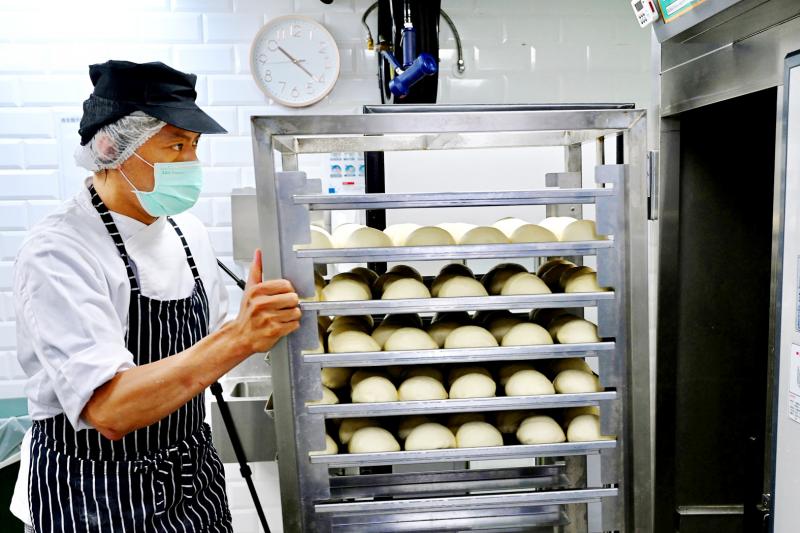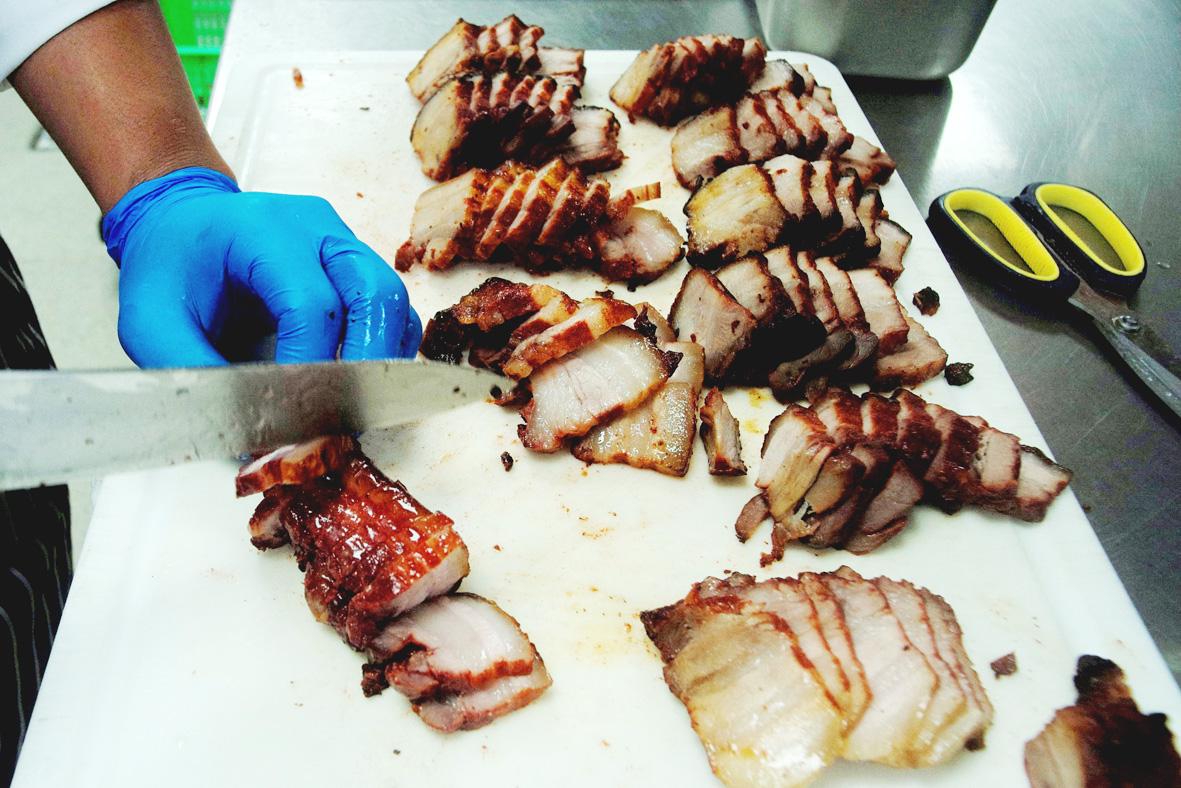In an industrial unit on the outskirts of Taipei chefs are plating meals that will never be served in a restaurant: welcome to the world of “ghost kitchens.”
Even before the pandemic sent an earthquake through the global restaurant trade, the “Amazonification” of commercial kitchens was well underway, but coronavirus lockdowns and restrictions have fueled explosive growth in Asia. The recent boom in food delivery apps meant customers were already used to having restaurant quality meals quickly delivered to their homes. To meet that demand a growing number of restaurants set up delivery only kitchens — also known as “cloud kitchens” — or rented space in ones.
Then the pandemic struck, ending dining out for billions.

Photo: AFP
“It really drove the whole industry into sort of hyper growth, so that really helped us,” said Jason Chen, the chief executive officer of JustKitchen.
JustKitchen started operating Taiwan’s first ghost kitchen early last year — now it runs 17 across the island, as well as one in Hong Kong and is aiming to expand into the Philippines and Singapore by the end of this year, he said.
Regional delivery giants like Singapore-based Grab and Indonesia’s GoJek have also jumped on the trend. Grab opened 20 new cloud kitchens in Southeast Asia last year, up from 42 before the pandemic.

Photo: AFP
The global ghost kitchen industry is expected to grow more than 12 percent each year to be worth some US$139.37 billion by 2028, according to a report by Researchandmarkets.com.
Asia Pacific, home to 4.3 billion people, already accounts for some 60 percent of the international market.
For many in the region’s densely populated cities, where living space is at a premium, eating daily from cheap restaurants or food stalls is more affordable and viable than cooking at home.
CULINARY GOLD RUSH
Research group Euromonitor estimates there are some 7,500 cloud kitchens now operating in China and 3,500 in India — compared to 1,500 for the US and 750 for Britain.
Third generation Thai restaurateur Natalie Phanphensophon had to pivot her family’s 45-strong restaurant empire into takeaway only for much of the last year because of the pandemic.
Her family own the popular Mango Tree and Coca chains, many located in now empty shopping malls where rents are high. Earlier this year they opened their first cloud kitchen on the outskirts of Bangkok, with plans for two more.
“Our goal is to ensure everyone on our boat can sail through this together,” the 35-year-old explained. Cloud kitchens, she said, are less lucrative than restaurants because people don’t order as many dishes compared to dining out. But their operating costs are far lower.
iBerry Group, which operates restaurants and ice cream shops mostly in shopping malls in Thailand, also set up a delivery only hub.
“Having a cloud kitchen is basically an oxygen mask for us during COVID-19,” said brand manager Thitanun Taveebhol. While conglomerates and chains have moved into delivery only operations, mom-and-pop cloud kitchens are also opening.
After recently retiring from Air India, Nirjash Roy Chowdhury, sunk his savings into setting up a cloud kitchen in Mumbai.
His six employees were from the hotel trade which has been ravaged by the pandemic. “They didn’t have anything to eat. If I can give somebody bread and butter by doing this, then there’s nothing like it,” the 61-year-old added.
‘FOOD SPEAKS FOR ITSELF’
Chowdhury estimates it will take six months to break even but is confident there is long term potential. “I think this cloud kitchen culture is here to stay,” he predicted.
Experts say that’s a safe bet.
Nailul Huda, an analyst at the Jakarta-based think-tank Institute for Development of Economics and Finance, says lower operating costs and the ordering habits of tech-savvy younger generations will ensure continued growth.
“People will keep ordering food even after the pandemic and I think that the ghost kitchen... has the potential to keep growing rapidly even after it’s over,” he said.
JustKitchen’s Chen says the pandemic has changed the way people order food direct to their door.
“Once you do it, you become so used to it, the convenience is hard to get away from... We are very positive of the outlook.”
At a time when so much of the catering industry was devastated, ghost kitchens have kept chefs, delivery drivers and wholesalers in business. But they have unavoidably added to the mountain of plastic already being produced. One recent study in Bangkok found plastic waste has nearly doubled during the pandemic, some of it because of food delivery services.
Food writer Leslie Tay says while ghost kitchens have “taken away the personality or the soul of the food to a certain extent”, there is space for them to thrive alongside dine-in restaurants.
“At the end of the day, I think the food speaks for itself... if your food is good, people will start talking about it.”

On April 26, The Lancet published a letter from two doctors at Taichung-based China Medical University Hospital (CMUH) warning that “Taiwan’s Health Care System is on the Brink of Collapse.” The authors said that “Years of policy inaction and mismanagement of resources have led to the National Health Insurance system operating under unsustainable conditions.” The pushback was immediate. Errors in the paper were quickly identified and publicized, to discredit the authors (the hospital apologized). CNA reported that CMUH said the letter described Taiwan in 2021 as having 62 nurses per 10,000 people, when the correct number was 78 nurses per 10,000

As we live longer, our risk of cognitive impairment is increasing. How can we delay the onset of symptoms? Do we have to give up every indulgence or can small changes make a difference? We asked neurologists for tips on how to keep our brains healthy for life. TAKE CARE OF YOUR HEALTH “All of the sensible things that apply to bodily health apply to brain health,” says Suzanne O’Sullivan, a consultant in neurology at the National Hospital for Neurology and Neurosurgery in London, and the author of The Age of Diagnosis. “When you’re 20, you can get away with absolute

May 5 to May 11 What started out as friction between Taiwanese students at Taichung First High School and a Japanese head cook escalated dramatically over the first two weeks of May 1927. It began on April 30 when the cook’s wife knew that lotus starch used in that night’s dinner had rat feces in it, but failed to inform staff until the meal was already prepared. The students believed that her silence was intentional, and filed a complaint. The school’s Japanese administrators sided with the cook’s family, dismissing the students as troublemakers and clamping down on their freedoms — with

As Donald Trump’s executive order in March led to the shuttering of Voice of America (VOA) — the global broadcaster whose roots date back to the fight against Nazi propaganda — he quickly attracted support from figures not used to aligning themselves with any US administration. Trump had ordered the US Agency for Global Media, the federal agency that funds VOA and other groups promoting independent journalism overseas, to be “eliminated to the maximum extent consistent with applicable law.” The decision suddenly halted programming in 49 languages to more than 425 million people. In Moscow, Margarita Simonyan, the hardline editor-in-chief of the